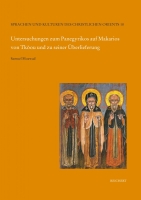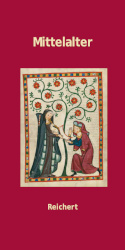Search
Untersuchungen zum Panegyrikos auf Makarios von Tkoou und zu seiner Überlieferung
2010
17.0 x 24.0 cm, 360 p., 9 tables b/w, hardback
ISBN: 9783895007804
17.0 x 24.0 cm, 360 p., 9 tables b/w, hardback
68,00 €
ISBN: 9783895007804
Short Description
The Panegyric on the Coptic bishop Macarius († 451) of the city of Tkoou in Upper Egypt is the only complete Coptic text that reports on the Council of Chalcedon in 451 A.D. It is a mixture out of hagiography, church history and theology. Beside a profound study of the Panegyric on Macarius in general, this book offers for the first time an edition of the Arabic version of the Panegyric with a German translation. This study also demonstrates how often this Panegyric has been used in later sources. Furthermore, the Panegyric on Macarius is used in this study as a base to shed light on the philosophy of writing history by the Copts.Description
This book deals with a very critical epoch in the history of Christian Egypt, namely the time around the Council of Chalcedon that was held in 451 A.D. by the command of the byzantine emperor Marcian.On the Council of Chalcedon the Coptic patriarch Dioscorus (444-454) was disposed and exiled because he refused the dogmatic (Christological) doctrine of this council. In his stead and against the will of the Copts, Emperor Marcian appointed a certain Proterius as the new patriarch of Alexandria. The Copts remained loyal to their disposed patriarch Dioscorus and resisted Proterius who was murdered in 457. The confliction between the two parties - the chalcedonians and antichalcedonians - continued for many centuries and was not without bloodshed on both sides.
Among the few works that report on this council is a panegyric on the Coptic bishop Macarius of the city Tkoou in Upper Egypt who accompanied Dioscorus to the Council of Chalcedon. The Panegyric on Macarius was traditionally attributed to the patriarch Dioscorus himself. The Panegyric on Macarius is handed down in Coptic and Arabic. The Coptic versions were mostly published. The Arabic version, in contrast, remained out of consideration.
This book presents first of all the historical and dogmatic background of the Panegyric on Macarius and demonstrates the important sources used in this study. After that the research history is summarised and discussed. The core of this study is the edition of the Arabic version of the Panegyric on Macarius with a critical apparatus and a German translation. The whole text is commented in every detail philologically as well as historically. The „Nachleben“ of the Panegyric on Macarius in later Coptic and Arabic literature is discussed in a separate chapter. It demonstrates how important the Panegyric on Macarius was for composing later literature and how this work was widespread in Coptic Egypt. The last part of the book sheds light on the philosophy of writing history by the Copts. It lumps together the most important historical sour-ces in the Coptic and Copto-Arabic literature and tries through a profound study to create a conception of how the Copts dealt with the writing of their own Church History. Furthermore, the collective memory of the Copts is analysed by exploring the available sources.
Biographical Note
Samuel MoawadBachelor of Egyptology at the University of Cairo (Egypt) 1995
Master of Coptology, Egyptology and Islamic studies at the University of Muenster (Germany) 2003
Ph.D. in Coptology at the University of Muenster (Germany) 2005
Post-doctoral project at the University of Muenster (Germany) 2006/2007
Researcher in the Faculty of Theology at the University of Leiden (Netherlands) 2007/2008
Researcher in the Institute for Egyptology and Coptology at the University of Muenster (Germany) since June 2008
Series Description
No english description available. Showing german description:
Sprachen und Kulturen des Christlichen Orients
Hg. von Johannes den Heijer, Stephen Emmel, Martin Krause
und Andrea B. Schmidt
Die international angelegte Reihe bietet Monographien, Handbücher, Sammelbände und Quellen zum Christlichen Orient. Dieser soll sowohl in seiner linguistischen und philologischen Breite erfasst werden (Äthiopisch, Arabisch, Armenisch, Georgisch, Koptisch, Nubisch, Syrisch) als auch in seiner kulturellen, religiösen und historischen Thematik. In ihrer zeitlichen Dimension erstreckt sich die Reihe von der frühbyzantinischen Epoche bis ins Spätmittelalter. Sie berücksichtigt vereinzelt auch gegenwartsbezogene Darstellungen über die orientalischen Gemeinschaften im Hinblick auf ihre Verwurzelung im christlich-historischen Umfeld.
Die Erforschung des Christlichen Orients erfolgt heute in verschiedenen Einzeldisziplinen, die jeweils auf bestimmte Sprachen oder geographische Regionen konzentriert sind. Neben dieser Spezialisierung besteht zugleich ein übergreifendes interdisziplinäres Interesse, die kulturellen und historischen Gemeinsamkeiten der einzelnen christlich-orientalischen Gemeinschaften in ihrer Verflochtenheit sichtbar zu machen. Die Absicht der Herausgeber ist es daher, detaillierte Fachstudien von führenden Wissenschaftlern aus ihrem jeweiligen Forschungsgebiet aufzunehmen. Zum andern wollen sie interdisziplinär angelegten Werken ein Forum bieten.
Der Christliche Osten hat für die Kulturgeschichte des europäischen Abendlandes eine wesentliche Rolle gespielt und dem Westen ein reiches Erbe vermittelt. Um diese Bedeutung zu erschließen, wendet sich die Reihe auch an Studenten und an die größere Öffentlichkeit. Mit dieser Gewichtung soll der Christliche Orient in seinen vielfältigen kulturhistorischen, künstlerischen und philologischen Aspekten gebührend ins Blickfeld gerückt werden.
Den Herausgebern steht ein internationales Beratergremium zur Seite.




 Preface
Preface

 Neuerscheinungen 2023/2024
Neuerscheinungen 2023/2024
 Gesamtverzeichnis 2023/2024
Gesamtverzeichnis 2023/2024
 Katalog Oriental Studies & Linguistics
Katalog Oriental Studies & Linguistics
 Mittelalter
Mittelalter
 Deutsche Inschriften
Deutsche Inschriften
 Musiktherapie
Musiktherapie
 Literaturen im Kontext
Literaturen im Kontext